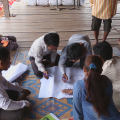Mekong delta, Vietnam’s rice bowl, is sinking
The delta is facing an existential crisis as rising sea levels, salinisation, and prolonged droughts threaten to alter the landscape irreversibly.
The Mekong delta in Vietnam is a world in itself, where water and earth intertwine in a primeval dance, creating a region of incredible fecundity and profound beauty, a testament not only to nature’s bounty but also its relentlessness. Yet, beneath this surface of life and abundance, the Mekong delta is on the front lines of a deadly battle against climate change and environmental degradation.
A paper published in Sustainability 1 in 2020 pointed out that rising sea levels and erratic rainfall are causing more frequent and intense floods, even in urban areas. And a study in Agricultural Water Management2 in 2020 showed that salt-water intrusion had gone deep into the inland paddy fields as a consequence of rising sea levels, while prolonged droughts were turning fertile fields into barren wastelands.
Salinisation, in fact, threatens the very foundation of rice cultivation in the delta, thus jeopardising the livelihoods of millions. Modern industry, meanwhile, intrudes with machinery and concrete, cash crops and pesticides, factories and huge dams, which further disrupts the delta’s delicate ecological balance.
The delta's future is further complicated by socio-economic changes. Urbanisation and industrialisation have increased the encroachments on agricultural land. Younger people are increasingly leaving rice cultivation and the delta for opportunities in the cities. The demographic shift is reducing the labour force available for rice farming, which is challenging the sustainability of traditional agricultural practices.
Continue reading on: Mekong delta, Vietnam’s rice bowl, is sinking | Frontline (frontline.thehindu.com)
Originally published in the Frontline, this article was authored by Rajesh Daniel at the Stockholm Environment Institute (SEI) Asia Centre, Thailand and My Lê, a fellow under the Mekong Thought Leadership and Think Tanks Program (MTT).
Notes and references
1. Hanh, P.T.T., &Furukawa, .T(2020). "Impact of climate change on flooding in Mekong delta: Case study of urban Can Tho". Sustainability, 12(1), 1-17
2. Eslami, H,. Hoang, L. P,. Bregt, A. K,. Hoekstra, A. Y,. &van Vliet, M. T. (2020). "Climate change impacts on water availability and salinity intrusion in the Mekong delta: Implications for rice production. Agricultural Water Management, 241, 1063363 [Nguyen, H. N,. Le, T.V. H., &Vu, L. H. (2019). "Sustainable agricultural development in the Mekong delta: Challenges and solutions." Sustainable Development and Agriculture, 3(2), 45-58; Also: https://www.statista.com/statistics/1196121/vietnam-mekong-delta-rice- production/
Info
This story is part of the following project
SUMERNET 4 All: Engaging with water insecurity in the Mekong Region
Topic
Country
Related people
You might be interested in
-
SUMERNET Vision Guide introducing the new phase "SUMERNET 4 All"
The new, revised "Vision Guide" for SUMERNET is now available. This vision guide presents an overview of SUMERNET - its origins and governance structure, background to the network, aims, key research areas, engagement with policy, and outreach products
![SUMERNET Vision Guide introducing the new phase "SUMERNET 4 All"]()
-
SUMERNET 4 All Call for Proposals on Joint Action
SUMERNET 4 All (S4A) provides financial support and technical assistance to consortia of researchers and boundary partners from the Mekong Region
![SUMERNET 4 All Call for Proposals on Joint Action]()
-
SUMERNET launches redesigned website to provide a fresh visual look and direction
SUMERNET is proud to announce the launch of our redesigned website to coincide with our new phase of work on addressing water insecurity in the Mekong Region.
![SUMERNET launches redesigned website to provide a fresh visual look and direction]()

 By
By




 Read more about SUMERNET
Read more about SUMERNET
